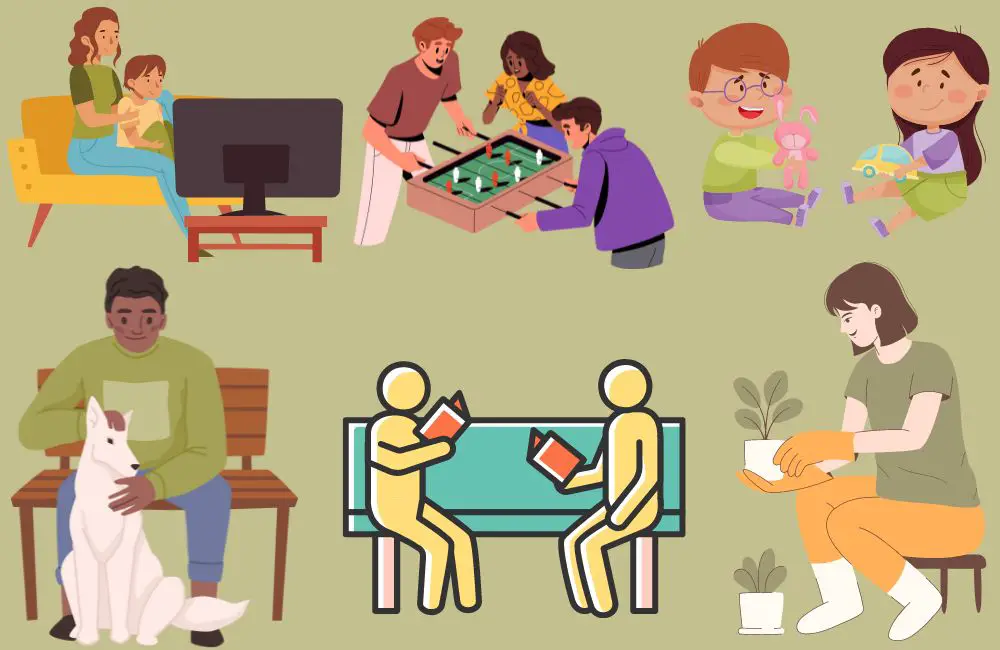As an ESL teacher, I have a clear understanding of the challenges faced by non-native speakers when engaging in conversation with English-speaking individuals. One topic that can serve as a great conversation starter is leisure time, which encompasses hobbies, interests, and how individuals spend their free time.
This subject is often favored because it allows people to share their passions and provides opportunities for mutual learning and understanding. In this comprehensive guide, I will provide tips and English expressions to help you comfortably ask about someone’s leisure time, ensuring you can easily engage in enriching conversations.
To ask about someone’s leisure time, use open-ended questions like “What do you do for fun?” or “How do you spend your free time?” Show genuine interest by saying, “That sounds interesting! Can you tell me more?” Sharing your hobbies and asking follow-up questions can also help enrich the conversation.
Are you looking for a book or a guide to help you learn and improve your English? You may try English Made Easy Volume One: A New ESL Approach: Learning English Through Pictures (Amazon Link).
Now, let’s learn some other English expressions that you can use to ask someone about their leisure time activities. I’ll also give some tips on how to use these expressions appropriately.
Initiating the Conversation
Starting a conversation about leisure time doesn’t have to be daunting. After the greeting, you can use simple, straightforward phrases to initiate the dialogue, asking about what the person enjoys doing when they aren’t working or studying. Here are some expressions to help you break the ice:
- What do you do for fun?
- How do you usually unwind during your free time?
- What kind of hobbies do you have?
- What’s your favorite way to spend the weekends?
- Do you have any particular interests or pastimes?
- How do you prefer to spend your time when you’re not working or studying?
- Are there any activities that you particularly enjoy in your downtime?
These open-ended questions are excellent conversation starters as they encourage the other person to provide more in-depth responses, giving you a glimpse into their interests and hobbies.
Expressing Genuine Interest
Conversations are two-way streets, and showing genuine interest in the other person’s hobbies can make the interaction more enjoyable and meaningful. You can express your curiosity and eagerness to learn more about their hobbies by using phrases such as:
- That’s fascinating! How did you start doing that?
- I’m not familiar with that. Could you explain more about it?
- What do you love most about this hobby?
- Could you tell me more about how you got into that?
- What made you choose this particular hobby?
- That’s unusual! What made you interested in it?
- How often do you engage in this activity?
These questions reflect your genuine interest in the person’s hobbies, making them feel valued and encouraging a deeper conversation.
Sharing Your Own Interests
Sharing your hobbies can make the conversation more balanced and engaging. Use these expressions to introduce your hobbies and interests:
- I also have a passion for riding bikes. Have you ever tried it?
- During my free time, I usually go fishing. What about you?
- One activity I really enjoy is playing cricket. Do you find that interesting too?
- Just like you, I also love making handicrafts. Have you done any similar activities?
- I spend a lot of my leisure time doing gardening. Is that something you’d be interested in?
By introducing your hobbies, you make the conversation more interactive and allow the other person to ask questions about your interests.
Engaging with Follow-Up Questions
Once the person has shared their hobbies, you can keep the conversation flowing by asking follow-up questions. This helps show your interest and lets them share more details about their passions. Consider the following questions:
- When did you start gardening?
- What challenges have you faced while pursuing this hobby?
- Do you participate in any groups or clubs related to your hobby?
- Have you ever competed or performed in this hobby?
- What’s the most memorable experience you’ve had with this hobby?
- How often do you engage in this activity?
- Are there any goals or milestones you’re aiming for in your hobby?
Discussing Related Topics
Often, hobbies lead to related topics of interest. For instance, a person interested in reading may also enjoy writing or book clubs. Use this opportunity to delve deeper into the conversation and find common ground. Here are some ways to steer the conversation toward related topics:
- Have you ever visited Cox’s Bazar?
- Could you recommend any books, movies, or resources about this hobby?
- What do you think about traveling during the pandemic?
- I’m curious, have you tried Table Tenis?
- What’s your favorite aspect of reading books?
- Do you follow any blogs, podcasts, or influencers in this field?
- How has this hobby influenced other areas of your life?
Offering Encouragement or Compliments
A little compliment goes a long way in making conversations more pleasant and encouraging. If you find something impressive about the other person’s hobby or if they’ve achieved something noteworthy, feel free to express your admiration with phrases such as:
- That’s truly impressive! How did you achieve that?
- Your dedication is really inspiring!
- It sounds like you have a natural talent for that!
- You must have worked really hard to get this far.
- That’s quite an achievement! You must be proud.
- Your passion for this hobby is infectious!
- I admire your commitment to this hobby.
Concluding the Conversation
As the conversation draws to a close, it’s important to leave positively. This shows your appreciation for the interaction and paves the way for future conversations. Here are some ways to conclude your conversation:
- I thoroughly enjoyed learning about your hobbies. Thanks for sharing!
- Our conversation about our leisure activities was really insightful. Let’s continue this next time!
- I had a great time talking about (their hobby). I hope we can do this again soon!
- I appreciate you sharing your passion for (their hobby). I look forward to our next chat!
Sample Conversation: Asking Someone About Their Leisure Time
Situation: Two colleagues, Alex and Maria, are having lunch together in the company cafeteria. Alex is curious about how Maria spends her free time.
Alex: Maria, we always talk about work, but I realize I don’t know much about what you like to do outside of the office. How do you usually spend your leisure time?
Maria: That’s a nice change of topic! Well, I’m a big fan of hiking. On weekends, I often head to nearby trails. The fresh air and exercise are so refreshing. How about you?
Alex: That sounds lovely! I’ve always wanted to get into hiking. I mostly spend my free time playing the guitar and reading novels. Music is a big passion of mine.
Maria: That’s cool! Maybe you could play for us at the next office gathering. And if you’re ever up for a hike, let me know. I’d be happy to recommend some trails.
Alex: I’d love that! It’s great to learn more about what my colleagues enjoy outside of work.
In Conclusion
While asking about someone’s leisure time activity, it’s not just about asking the right questions; it’s about showing genuine interest, sharing your experiences, and connecting on a personal level. Use this guide to start asking people about their leisure time, and you’ll soon find yourself having meaningful and enjoyable conversations in English.
After all, learning a language is not just about textbooks and grammar; it’s about engaging with people, understanding their cultures, and building lasting relationships. I encourage you to step out of your comfort zone, start a conversation, and explore the fascinating world of hobbies and leisure activities.
10 Frequently Asked Questions Related to Asking Someone About Their Leisure Time
1. Is it appropriate to ask colleagues about their leisure activities?
Yes, it’s a friendly way to get to know them better, as long as it’s done respectfully and without prying.
2. What are some other ways to ask about someone’s hobbies?
You can ask, “What do you like to do for fun?” or “Do you have any hobbies or interests?”
3. How can I ask someone about their weekend plans?
“Any plans for the weekend?” or “Doing anything fun this weekend?” are casual ways to inquire.
4. How can I ask about someone’s recent vacation?
You can ask, “How was your trip?” or “Tell me about your vacation!”
5. How can I ask if someone is into sports or physical activities?
“Are you into any sports?” or “Do you play any games or work out?”
6. How can I ask about someone’s artistic pursuits?
“Do you play any musical instruments?” or “Do you enjoy any creative activities?”
7. How can I ask if someone is a reader?
“Do you enjoy reading?” or “Any book recommendations?”
8. How can I ask about someone’s favorite way to relax?
“How do you like to unwind after a long day?” or “What’s your go-to relaxation activity?”
9. How can I ask if someone enjoys traveling?
“Do you love traveling?” or “Have you been on any exciting trips lately?”
10. How can I ask about someone’s favorite TV shows or movies?
“Have you watched any good shows recently?” or “Do you have any movie recommendations?”






